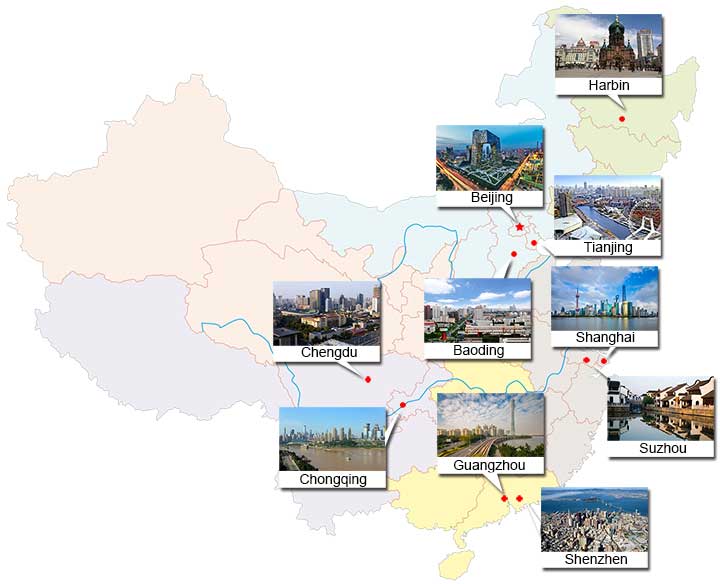At the start of 2020, it was recorded that 904 million people in China had access to the internet and this number is only continuing to grow. This is great news for e-commerce businesses and those who advertise their goods and services online, as the ever-expanding middle class in China has become renown for their love of shopping over the internet – and they certainly aren’t afraid to part with their cash! The only problem for western businesses is that it can be harder for them to find your goods and services even if you usually rank well in Google.
Why? Because China’s most popular search engine is not Google, it is Baidu.

Figures from this year show that the search engine reaches over 1.1 billion devices in China and the app sees around 200 million daily users. This begs the question for any business hoping to tap into the Chinese market, can you really afford to ignore Baidu?

Source: StatCounter
That being said, conducting SEO for Baidu isn’t as simple as translating your usual tactics from Google across to a new platform. Baidu requires a different kind of marketing, largely because of the Great Firewall of China (GFW) which is a mixture of legislative actions and technologies that are used to regulate internet usage over there.
So in order to tap into Baidu’s full potential, you’ll need to get to grips with different SEO strategies and techniques. Sounds like a lot of work, right? Well, don’t worry because we’re here to make it a little bit easier! Below, we’ve put together an extensive guide that will look at every aspect of SEO for Baidu from web hosting to finding Chinese keyword volumes and geo-tagging. Read on to find out how your business can begin boosting its rankings.
Start With Your Domain Prefix
When it comes to SEO and ranking well, Google has always had its own quirks, regulations and preferences and there are professionals out there that have dedicated their lives to understanding these. Well, much like Google, Baidu also has its own rules, regulations and preferences and you need to be able to utilise these if you want to rank well.
One of the key things to note about this search engine is that it favours the more local .Cn domain suffix over the more traditionally recognised .Com or .Org. With this in mind, one of the best ways to ensure you rank well in Baidu is to invest in a .Cn version of your website and the good news is this doesn’t have to be a lengthy or expensive process. Hosts like GoDaddy will be able to set you up a new domain relatively quickly and cheaply.
Another point worth noting is that Baidu prefers everything to come from a top-level domain, so try to avoid spreading your brand out over several related domains or making subdomains for pages like your company blog. It’s best to stick to one .Cn website and have everything accessible through there. This will give you the best chance of ranking well in Baidu.
Choose The Right Web Host
As we’ve already discussed, the Chinese search engine prefers the use of the local domain suffix and the same applies to many other resources you might need for your website. It’s true that the Chinese prefer their own resources, they believe them to be more reliable and trustworthy, so where possible it pays to use Chinese tools, such as web hosts.
You might already have a great web host for your original site, but if it’s located outside of China, this isn’t going to fare well for your .Cn version. Baidu favours Chinese web hosts and will penalise sites that come from outside their nation. Which brings us to the next point, how do you go about finding yourself the right web host?
Lucky for us (and you) there are review sites out there that can take some of the hard work out of finding a host. This guide from Hosting.Info rates the best Chinese hosting companies as of September 2020 and even outlines some of the best and worst features. Using helpful resources like this, you can do some thorough research until you find the right platform for you.
And before you begin moving cash around and panicking about this new expense remember, as of March 2020 a staggering 710.3 million people in China had purchased goods online. This is a huge percentage of the market share so this really is a worthy investment!
Get Yourself An ICP License
We’ve briefly mentioned the strict firewall and internet regulations in China and another aspect that could let you down when it comes to ranking on Baidu is not having an Internet Content Publishing License (ICP).
An ICP is required if you want the Government to let you operate a website in China. The problem is that it’s hard to qualify for a license without a physical presence in the country. But all hope is not lost, by switching to a .Cn domain you can boost your chances of being granted an ICP as long as all related URLs are .Cn as well. Alternatively, you can partner with a local Chinese company who can vouch for your business.
It’s worth noting that there are different types of ICPs available and you’re going to need the business license if you hope to pursue profit. Check out this guide from Zenlayer for more information on getting an ICP from China.
Find The Right Keywords
Now let’s move away from the more technical, legal side of the Chinese internet and back to the more traditional elements that we recognise as SEO. Keyword search volumes are an important metric for optimising your website and any related content (such as advertising, blog posts and social media content) but your usual keyword tools are unlikely to be helpful when it comes to Baidu. As such, there are several things you can do to help you find the right keywords.
Firstly, you can visit the search engine yourself and run keyword research like you would on Google. The dropdown menu will still reveal some of the most relevant and popular phrases being searched for in China. You can do the same on other popular Chinese search engines until you’ve compiled a list of keywords and phrases.
Not only this, but there are a number of tools that can help you identify keywords such as Zhanzhang and Aizhan. As we mentioned earlier, choosing Chinese tools is usually your best bet.
Baidu itself also offers a very helpful (and free) Keyword Planner and all you need to do to access this is sign up for a Baidu account (again, this is free). Here you can filter by key metrics such as daily search volume and competition level.
It’s a good idea to have a play around until you discover which tool works best for you. This might also depend on your budget. But armed with the right keywords and phrases, you’ll be able to boost your chances of ranking well on Baidu for your relevant search terms.
Considering Location When Targeting Consumers
China has some of the most densely populated cities in the world, which should mean that there are plenty of consumers to target in these areas. However, in recent years marketers have noticed a saturation in these crowded areas and a move to the second and third-tier cities that have much smaller populations. These markets are largely untapped by western brands and so could be the prime targets for online businesses looking to target consumers by location.

Why are we telling you this? Not only is it a great opportunity to sell to unexplored markets, but by optimising your website and content for location you can rank better on Baidu for searches in and around these areas. There are several different ways you should take location into account when targeting consumers.
Optimising for mobile
The number of online consumers in China using mobile devices to shop reached over 1 billion unique devices in September 2019, proving that optimising for mobile is absolutely crucial. It’s clear that mobile devices reign supreme across the nation and failing to recognise this could have repercussions for your website. Search engines like Baidu will take user experience and metrics like bounce rate into consideration when deciding how to rank your site.
Tailoring your branding
You might already have killer branding on your .Com or .Org site, but attracting a Chinese audience means tweaking this accordingly. Show that you have an understanding of national trends, cultures and local preferences. You could even create targeted marketing campaigns aimed at those living in specific regions or cities.
Don’t Neglect On-Page Optimisation
On-site optimisation is required to help the bots crawl your pages and accurately index and rank your website in search engine page results (SERPs). There are several ways you can make it easier for bots and algorithms to rank your website on Baidu and these include:
Keywords: Baidu is a little bit behind Google (for now) in terms of their algorithm for keywords. As such, you can afford to apply some of the older SEO tactics more liberally when it comes to placing keywords in your content. That said, this does not give you a license to stuff your pages with keywords leading to confusing copy that doesn’t read well. It’s China, not 2005!
Internal linking: Baidu prefers that your homepage only links to main category pages and not to sub-categories, it also requires that every page link back to your homepage in some way. Pages that are not linked to in any way will be considered orphans and will not be indexed. You should also include strong descriptions in your link anchor text and make sure there are no links within your Javascript or Flash. Finally, you can boost your rankings drastically by regularly cleaning up your links ensuring there are no broken or redirected links on your website.
JavaScript: The search engine is not too proud to admit that the Baidu bots struggle when it comes to JavaScript, AJAX content or any links inside your JavaScript. Because of this, it’s a good idea to remove these as much as possible. Otherwise, you could find that these will affect how your website renders in China.
Social media: You might have been told a thousand times about the importance of social media and linking up your platforms to create one seamless and beautiful online presence. Well, you can forget that – just for now! Many popular social media sites such as Facebook and YouTube have been banned by the Chinese government, so trying to add widgets or links to these pages can cause the website to run slowly, which won’t be good for user experience or boosting your visibility.
In summary
Now we know that there’s a lot to take in and there are several major differences between trying to rank for sites like Google and trying to rank for Baidu. So to help you out, we’ve pulled together a quick summary to recap on the key points we made in this guide:
- The best place to start is with your domain prefix – Get a .Cn domain to boost your chances of ranking on Baidu
- Choose the right web host – Choosing a Chinese web host makes your site look more trustworthy and can increase your rankings
- Try to get yourself an ICP license – If possible you should obtain an Internet Content Publishing License. The easiest way to do this is to partner with a local company
- Find the most relevant keywords – Use the right tools (such as Baidu’s keyword planner) to help you find the most relevant keywords for your content
- Consider location when targeting consumers – Consider the preferences, cultures and trends in China, including the vast number of people that make purchases via their smartphone or tablets
- Don’t neglect on-page optimisation – As you would with any search engine you need to optimise your pages with keywords and links. It’s worth noting that Baidu do things differently so remove JavaScript where you can and avoid linking to your social media profiles
And that’s it! Follow these steps to begin your journey to conquering the Chinese market and ranking well on Baidu. If you would like some help on achieving your goals from a specialist SEO agency, feel free to get in touch with us.



